Shengnan An
Alphabetical order by last name
LongCat-Flash-Thinking-2601 Technical Report
Jan 23, 2026Abstract:We introduce LongCat-Flash-Thinking-2601, a 560-billion-parameter open-source Mixture-of-Experts (MoE) reasoning model with superior agentic reasoning capability. LongCat-Flash-Thinking-2601 achieves state-of-the-art performance among open-source models on a wide range of agentic benchmarks, including agentic search, agentic tool use, and tool-integrated reasoning. Beyond benchmark performance, the model demonstrates strong generalization to complex tool interactions and robust behavior under noisy real-world environments. Its advanced capability stems from a unified training framework that combines domain-parallel expert training with subsequent fusion, together with an end-to-end co-design of data construction, environments, algorithms, and infrastructure spanning from pre-training to post-training. In particular, the model's strong generalization capability in complex tool-use are driven by our in-depth exploration of environment scaling and principled task construction. To optimize long-tailed, skewed generation and multi-turn agentic interactions, and to enable stable training across over 10,000 environments spanning more than 20 domains, we systematically extend our asynchronous reinforcement learning framework, DORA, for stable and efficient large-scale multi-environment training. Furthermore, recognizing that real-world tasks are inherently noisy, we conduct a systematic analysis and decomposition of real-world noise patterns, and design targeted training procedures to explicitly incorporate such imperfections into the training process, resulting in improved robustness for real-world applications. To further enhance performance on complex reasoning tasks, we introduce a Heavy Thinking mode that enables effective test-time scaling by jointly expanding reasoning depth and width through intensive parallel thinking.
AMO-Bench: Large Language Models Still Struggle in High School Math Competitions
Oct 30, 2025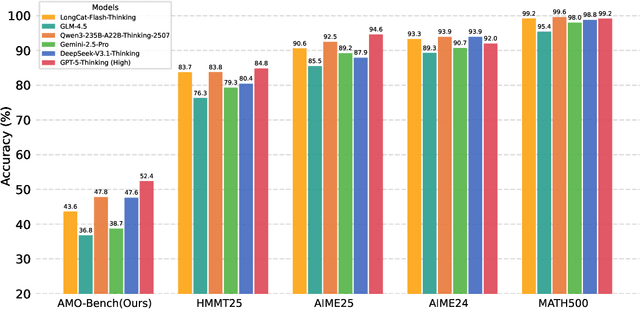
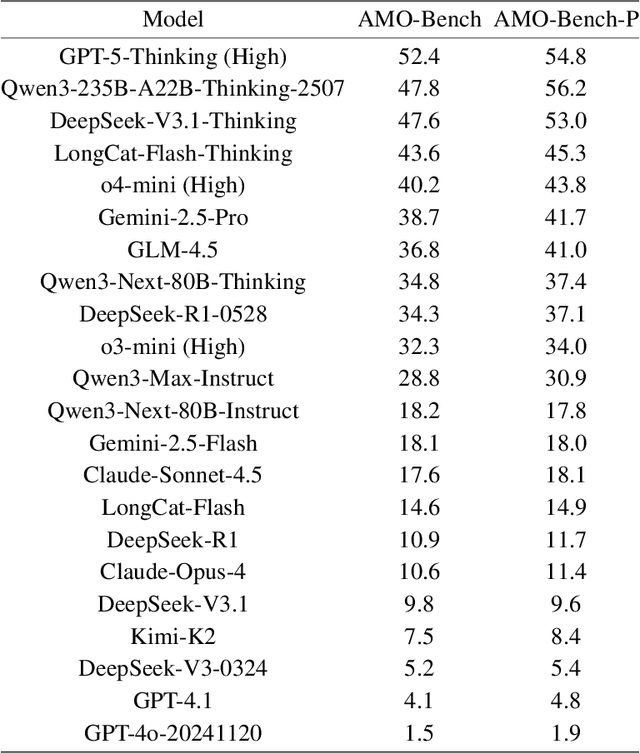

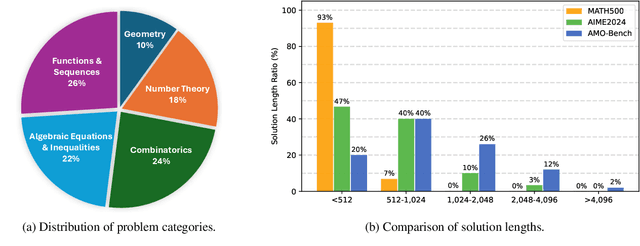
Abstract:We present AMO-Bench, an Advanced Mathematical reasoning benchmark with Olympiad level or even higher difficulty, comprising 50 human-crafted problems. Existing benchmarks have widely leveraged high school math competitions for evaluating mathematical reasoning capabilities of large language models (LLMs). However, many existing math competitions are becoming less effective for assessing top-tier LLMs due to performance saturation (e.g., AIME24/25). To address this, AMO-Bench introduces more rigorous challenges by ensuring all 50 problems are (1) cross-validated by experts to meet at least the International Mathematical Olympiad (IMO) difficulty standards, and (2) entirely original problems to prevent potential performance leakages from data memorization. Moreover, each problem in AMO-Bench requires only a final answer rather than a proof, enabling automatic and robust grading for evaluation. Experimental results across 26 LLMs on AMO-Bench show that even the best-performing model achieves only 52.4% accuracy on AMO-Bench, with most LLMs scoring below 40%. Beyond these poor performances, our further analysis reveals a promising scaling trend with increasing test-time compute on AMO-Bench. These results highlight the significant room for improving the mathematical reasoning in current LLMs. We release AMO-Bench to facilitate further research into advancing the reasoning abilities of language models. https://amo-bench.github.io/
Repository Structure-Aware Training Makes SLMs Better Issue Resolver
Dec 26, 2024Abstract:Language models have been applied to various software development tasks, but the performance varies according to the scale of the models. Large Language Models (LLMs) outperform Small Language Models (SLMs) in complex tasks like repository-level issue resolving, but raise concerns about privacy and cost. In contrast, SLMs are more accessible but under-perform in complex tasks. In this paper, we introduce ReSAT (Repository Structure-Aware Training), construct training data based on a large number of issues and corresponding pull requests from open-source communities to enhance the model's understanding of repository structure and issue resolving ability. We construct two types of training data: (1) localization training data, a multi-level progressive localization data to improve code understanding and localization capability; (2) code edit training data, which improves context-based code editing capability. The evaluation results on SWE-Bench-verified and RepoQA demonstrate that ReSAT effectively enhances SLMs' issue-resolving and repository-level long-context understanding capabilities.
Dehallucinating Parallel Context Extension for Retrieval-Augmented Generation
Dec 19, 2024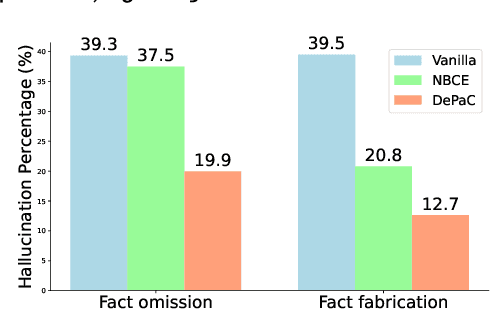



Abstract:Large language models (LLMs) are susceptible to generating hallucinated information, despite the integration of retrieval-augmented generation (RAG). Parallel context extension (PCE) is a line of research attempting to effectively integrating parallel (unordered) contexts, while it still suffers from hallucinations when adapted to RAG scenarios. In this paper, we propose DePaC (Dehallucinating Parallel Context Extension), which alleviates the hallucination problem with context-aware negative training and information-calibrated aggregation. DePaC is designed to alleviate two types of in-context hallucination: fact fabrication (i.e., LLMs present claims that are not supported by the contexts) and fact omission (i.e., LLMs fail to present claims that can be supported by the contexts). Specifically, (1) for fact fabrication, we apply the context-aware negative training that fine-tunes the LLMs with negative supervisions, thus explicitly guiding the LLMs to refuse to answer when contexts are not related to questions; (2) for fact omission, we propose the information-calibrated aggregation which prioritizes context windows with higher information increment from their contexts. The experimental results on nine RAG tasks demonstrate that DePaC significantly alleviates the two types of hallucination and consistently achieves better performances on these tasks.
STAND-Guard: A Small Task-Adaptive Content Moderation Model
Nov 07, 2024

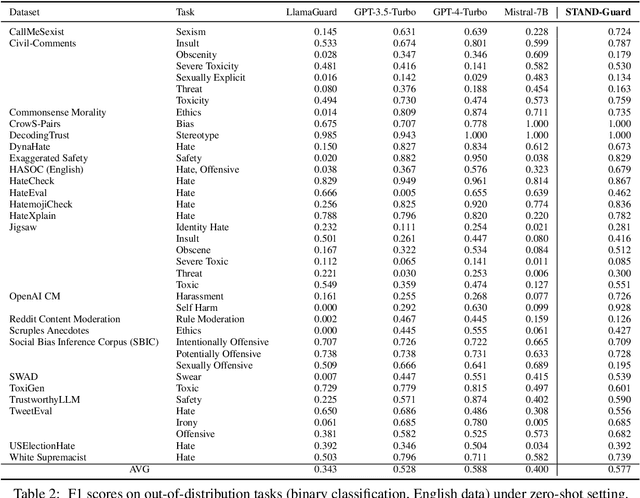

Abstract:Content moderation, the process of reviewing and monitoring the safety of generated content, is important for development of welcoming online platforms and responsible large language models. Content moderation contains various tasks, each with its unique requirements tailored to specific scenarios. Therefore, it is crucial to develop a model that can be easily adapted to novel or customized content moderation tasks accurately without extensive model tuning. This paper presents STAND-GUARD, a Small Task-Adaptive coNtent moDeration model. The basic motivation is: by performing instruct tuning on various content moderation tasks, we can unleash the power of small language models (SLMs) on unseen (out-of-distribution) content moderation tasks. We also carefully study the effects of training tasks and model size on the efficacy of cross-task fine-tuning mechanism. Experiments demonstrate STAND-Guard is comparable to GPT-3.5-Turbo across over 40 public datasets, as well as proprietary datasets derived from real-world business scenarios. Remarkably, STAND-Guard achieved nearly equivalent results to GPT-4-Turbo on unseen English binary classification tasks
Make Your LLM Fully Utilize the Context
Apr 26, 2024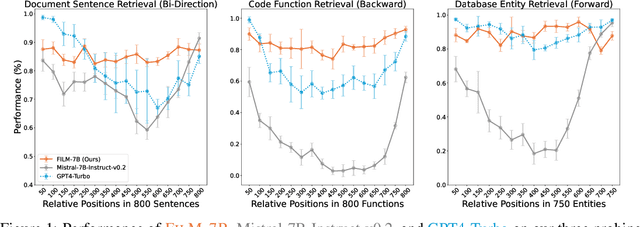

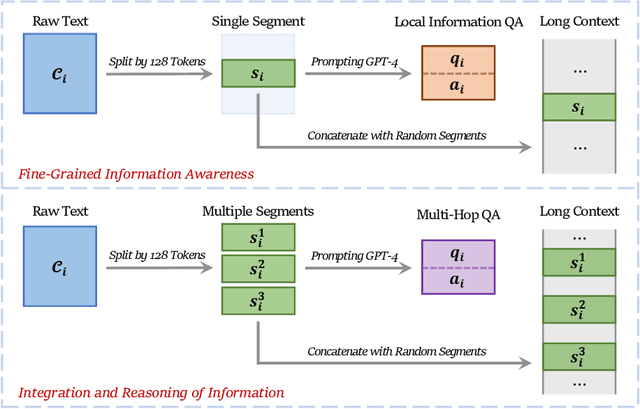
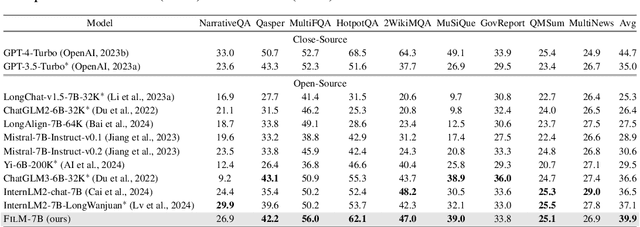
Abstract:While many contemporary large language models (LLMs) can process lengthy input, they still struggle to fully utilize information within the long context, known as the lost-in-the-middle challenge. We hypothesize that it stems from insufficient explicit supervision during the long-context training, which fails to emphasize that any position in a long context can hold crucial information. Based on this intuition, our study presents information-intensive (IN2) training, a purely data-driven solution to overcome lost-in-the-middle. Specifically, IN2 training leverages a synthesized long-context question-answer dataset, where the answer requires (1) fine-grained information awareness on a short segment (~128 tokens) within a synthesized long context (4K-32K tokens), and (2) the integration and reasoning of information from two or more short segments. Through applying this information-intensive training on Mistral-7B, we present FILM-7B (FILl-in-the-Middle). To thoroughly assess the ability of FILM-7B for utilizing long contexts, we design three probing tasks that encompass various context styles (document, code, and structured-data context) and information retrieval patterns (forward, backward, and bi-directional retrieval). The probing results demonstrate that FILM-7B can robustly retrieve information from different positions in its 32K context window. Beyond these probing tasks, FILM-7B significantly improves the performance on real-world long-context tasks (e.g., 23.5->26.9 F1 score on NarrativeQA), while maintaining a comparable performance on short-context tasks (e.g., 59.3->59.2 accuracy on MMLU). Github Link: https://github.com/microsoft/FILM.
Compositional API Recommendation for Library-Oriented Code Generation
Feb 29, 2024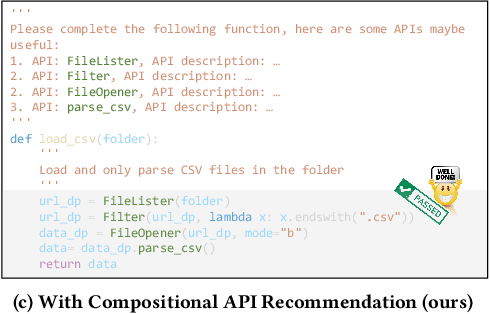


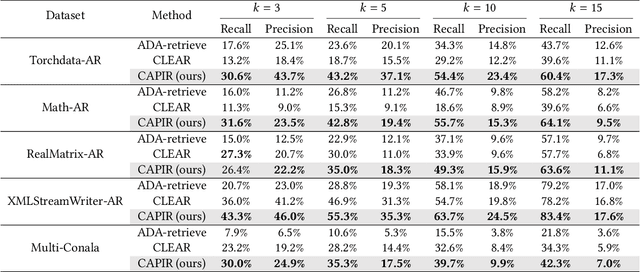
Abstract:Large language models (LLMs) have achieved exceptional performance in code generation. However, the performance remains unsatisfactory in generating library-oriented code, especially for the libraries not present in the training data of LLMs. Previous work utilizes API recommendation technology to help LLMs use libraries: it retrieves APIs related to the user requirements, then leverages them as context to prompt LLMs. However, developmental requirements can be coarse-grained, requiring a combination of multiple fine-grained APIs. This granularity inconsistency makes API recommendation a challenging task. To address this, we propose CAPIR (Compositional API Recommendation), which adopts a "divide-and-conquer" strategy to recommend APIs for coarse-grained requirements. Specifically, CAPIR employs an LLM-based Decomposer to break down a coarse-grained task description into several detailed subtasks. Then, CAPIR applies an embedding-based Retriever to identify relevant APIs corresponding to each subtask. Moreover, CAPIR leverages an LLM-based Reranker to filter out redundant APIs and provides the final recommendation. To facilitate the evaluation of API recommendation methods on coarse-grained requirements, we present two challenging benchmarks, RAPID (Recommend APIs based on Documentation) and LOCG (Library-Oriented Code Generation). Experimental results on these benchmarks, demonstrate the effectiveness of CAPIR in comparison to existing baselines. Specifically, on RAPID's Torchdata-AR dataset, compared to the state-of-the-art API recommendation approach, CAPIR improves recall@5 from 18.7% to 43.2% and precision@5 from 15.5% to 37.1%. On LOCG's Torchdata-Code dataset, compared to code generation without API recommendation, CAPIR improves pass@100 from 16.0% to 28.0%.
Learning From Mistakes Makes LLM Better Reasoner
Nov 14, 2023Abstract:Large language models (LLMs) recently exhibited remarkable reasoning capabilities on solving math problems. To further improve this capability, this work proposes Learning from Mistakes (LeMa), akin to human learning processes. Consider a human student who failed to solve a math problem, he will learn from what mistake he has made and how to correct it. Mimicking this error-driven learning process, LeMa fine-tunes LLMs on mistake-correction data pairs generated by GPT-4. Specifically, we first collect inaccurate reasoning paths from various LLMs and then employ GPT-4 as a "corrector" to (1) identify the mistake step, (2) explain the reason for the mistake, and (3) correct the mistake and generate the final answer. Experimental results demonstrate the effectiveness of LeMa: across five backbone LLMs and two mathematical reasoning tasks, LeMa consistently improves the performance compared with fine-tuning on CoT data alone. Impressively, LeMa can also benefit specialized LLMs such as WizardMath and MetaMath, achieving 85.4% pass@1 accuracy on GSM8K and 27.1% on MATH. This surpasses the SOTA performance achieved by non-execution open-source models on these challenging tasks. Our code, data and models will be publicly available at https://github.com/microsoft/LEMA.
Skill-Based Few-Shot Selection for In-Context Learning
May 23, 2023



Abstract:In-Context learning is the paradigm that adapts large language models to downstream tasks by providing a few examples. Few-shot selection -- selecting appropriate examples for each test instance separately -- is important for in-context learning. In this paper, we propose Skill-KNN, a skill-based few-shot selection method for in-context learning. The key advantages of Skill-KNN include: (1) it addresses the problem that existing methods based on pre-trained embeddings can be easily biased by surface natural language features that are not important for the target task; (2) it does not require training or fine-tuning of any models, making it suitable for frequently expanding or changing example banks. The key insight is to optimize the inputs fed into the embedding model, rather than tuning the model itself. Technically, Skill-KNN generates the skill-based representations for each test case and candidate example by utilizing a pre-processing few-shot prompting, thus eliminating unimportant surface features. Experimental results across four cross-domain semantic parsing tasks and four backbone models show that Skill-KNN significantly outperforms existing methods.
How Do In-Context Examples Affect Compositional Generalization?
May 08, 2023Abstract:Compositional generalization--understanding unseen combinations of seen primitives--is an essential reasoning capability in human intelligence. The AI community mainly studies this capability by fine-tuning neural networks on lots of training samples, while it is still unclear whether and how in-context learning--the prevailing few-shot paradigm based on large language models--exhibits compositional generalization. In this paper, we present CoFe, a test suite to investigate in-context compositional generalization. We find that the compositional generalization performance can be easily affected by the selection of in-context examples, thus raising the research question what the key factors are to make good in-context examples for compositional generalization. We study three potential factors: similarity, diversity and complexity. Our systematic experiments indicate that in-context examples should be structurally similar to the test case, diverse from each other, and individually simple. Furthermore, two strong limitations are observed: in-context compositional generalization on fictional words is much weaker than that on commonly used ones; it is still critical that the in-context examples should cover required linguistic structures, even though the backbone model has been pre-trained on large corpus. We hope our analysis would facilitate the understanding and utilization of in-context learning paradigm.
 Add to Chrome
Add to Chrome Add to Firefox
Add to Firefox Add to Edge
Add to Edge